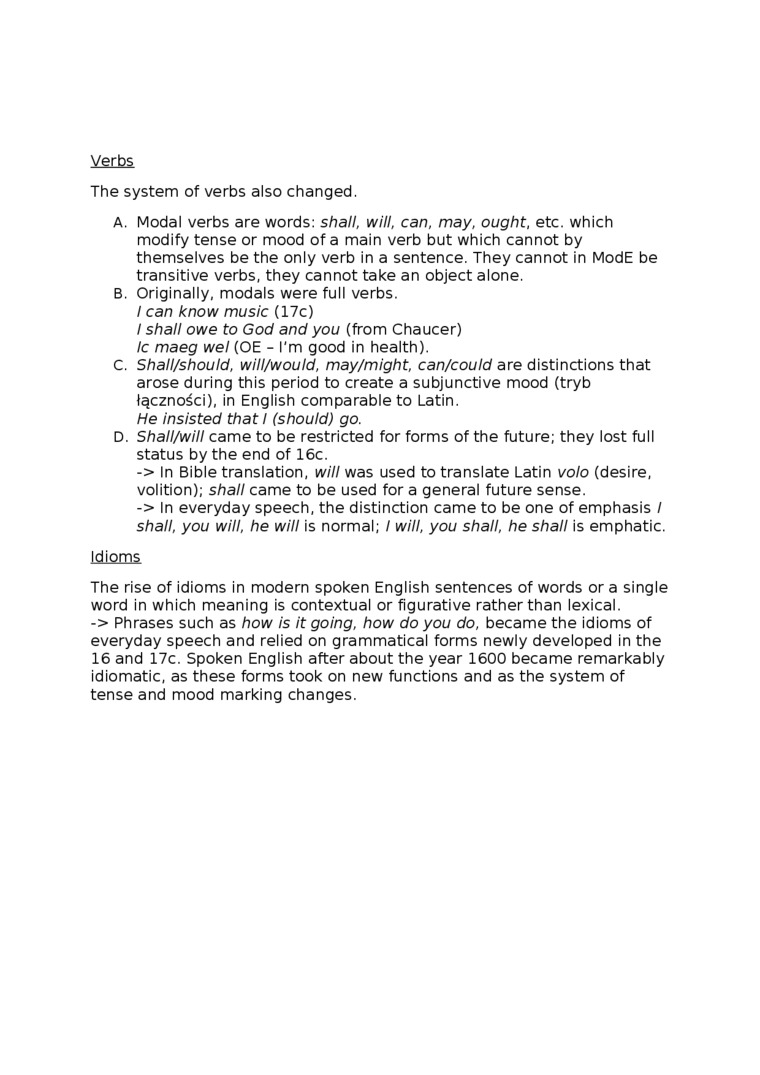95487

yerbs
The system of verbs also changed.
A. Modal verbs are words: shall, will, can, may, ought, etc. which modify tense or mood of a main verb but which cannot by themselves be the only verb in a sentence. They cannot in ModE be transitive verbs, they cannot take an object alone.
B. Originally, modals were fuli verbs.
I can know musie (17c)
I shall owe to God and you (from Chaucer)
Ic maeg wel (OE - l'm good in health).
C. Shall/should, will/would, may/might, can/could are distinctions that arose during this period to create a subjunctive mood (tryb łączności), in English comparableto Latin.
He insisted that I (should) go.
D. Shall/will came to be restricted for forms of the futurę; they lost fuli status by the end of 16c.
-> In Bibie translation, will was used to translate Latin volo (desire, volition); shall came to be used for a generał futurę sense.
-> In everyday speech, the distinction came to be one of emphasis / shall, you will, he will is normal; / will, you shall, he shall is emphatic.
Idioms
The rise of idioms in modern spoken English sentences of words or a single word in which meaning is contextual or figurative ratherthan lexical.
-> Phrases such as how is it going, how do you do, became the idioms of everyday speech and relied on grammatical forms newly developed in the 16 and 17c. Spoken English after about the year 1600 became remarkably idiomatic, as these forms took on new functions and as the system of tense and mood marking changes.
Wyszukiwarka
Podobne podstrony:
is the result of human induced changes in landscape of Tuchola Pinewoods in the last 200 years. The
THE SYSTEM OF EDUCATION IN THE REPUBLIC OF POLANDSCHOOLS AND DIPLOMASbyJoanna Jung-Miklaszewska tran
introduction This study provides basie information on the system of education in Poland, focusing in
THE CPTWD METHOD Besides this, the rangę of U has also been increased to 50 Bar in order to achieve
130 Agata Borowska-Pietrzak surveys can sensitize the area of HRM to changes in employee preferences
CCF20110118�001 THE SYSTEM OF TUNES The 12 Times 1. , 1av1i dei 7. ! 1av1i /de i 2. 1av1i dei 8
Piotr Ogrodowczyk Covert services in the system of modern State.............................177 Jace
4 2. The "Austrian Way": The System of Social Partnership The fact that Austria, in compar
THE SYSTEM OF EDUCATION IN POLAND. SCHOOL YEAR 2013/2014 Źródło:
CSG109 98 Complete Spanish Grammar 9-3ejercicio Decide. From the list of verbs, choose the one thatf
więcej podobnych podstron